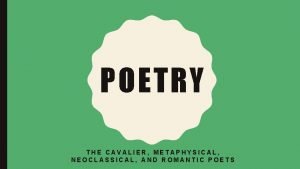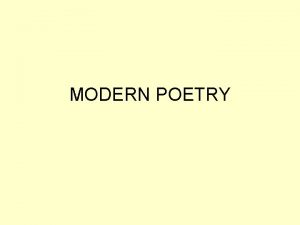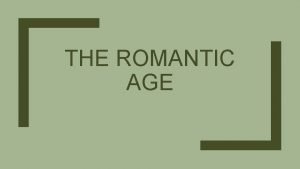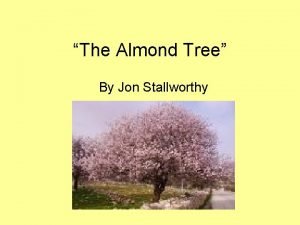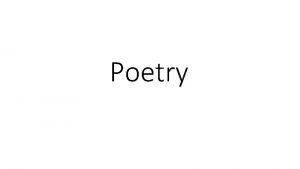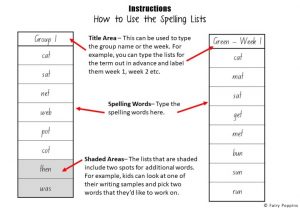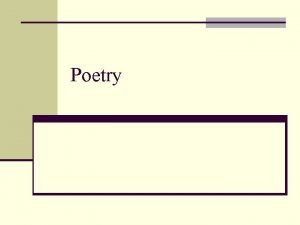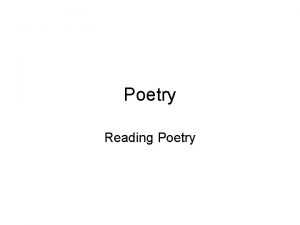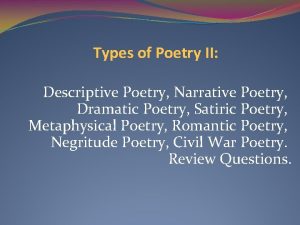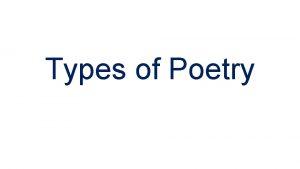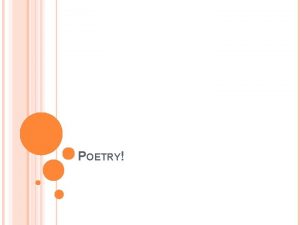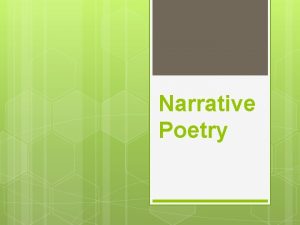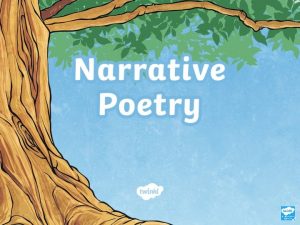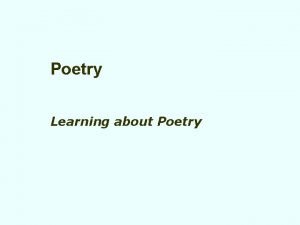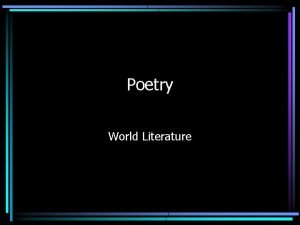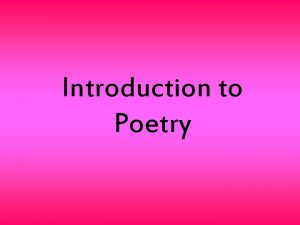What is Narrative Poetry It The word narrative


















- Slides: 18


What is Narrative Poetry? It The word ‘narrative’ Compare means ‘story’. So, quite simply, a ‘narrative poem’ is a poem that tells a story. Discuss It What will be the similarities and differences between a narrative poem and a plain narrative or story? Have a chat and then compare your results. Similarities: • Tell a story • Have a setting • Have characters • They might both be long • Good description • Action and description Differences: • Stories have chapters and paragraphs, poems have verses. • Poems rhyme • Poems have more figurative language • Poets need to think about syllables. • Poems usually have less speech. • Repetition and rhythm in poems.

The Poems 1. Owl and the Pussycat by Edward Lear 2. The Walrus and the Carpenter by Lewis Carroll 3. Jabberwocky by Lewis Carroll

The Owl and the Pussycat by Edward Lear I The Owl and the Pussy-cat went to sea In a beautiful pea-green boat, They took some honey, and plenty of money, Wrapped up in a five-pound note. The Owl looked up to the stars above, And sang to a small guitar, "O lovely Pussy! O Pussy, my love, What a beautiful Pussy you are, You are! What a beautiful Pussy you are!" Page 1 of 3

II Pussy said to the Owl, "You elegant fowl! How charmingly sweet you sing! O let us be married! too long we have tarried: But what shall we do for a ring? " They sailed away, for a year and a day, To the land where the Bong-Tree grows And there in a wood a Piggy-wig stood With a ring at the end of his nose, His nose, With a ring at the end of his nose. Page 2 of 3

III "Dear Pig, are you willing to sell for one shilling Your ring? " Said the Piggy, "I will. " So they took it away, and were married next day By the Turkey who lives on the hill. They dined on mince, and slices of quince, Which they ate with a runcible spoon; And hand in hand, on the edge of the sand, They danced by the light of the moon, They danced by the light of the moon. Page 3 of 3

The Owl and the Pussycat by Edward Lear 1. Who are the main characters? The owl and pussycat, a pig and a turkey. 2. What features of narrative poetry can you note in the poem? Narrative poems tell a story and tend to be long, with multiple verses; they usually rhyme, with a relatively easy rhyme and rhythm structure to make it easier to recite aloud. 3. Choose a verse and illustrate it. 4. Make your own video/audio recording of this poem.

The Walrus and the Carpenter by Lewis Carroll The sun was shining on the sea, Shining with all his might: He did his very best to make The billows smooth and bright -And this was odd, because it was The middle of the night. Page 1 of 10

The moon was shining sulkily, Because she thought the sun Had got no business to be there After the day was done – 'It's very rude of him. ' she said, 'To come and spoil the fun!' The sea was wet could be, The sands were dry as dry. You could not see a cloud, because No cloud was in the sky: No birds were flying overhead -There were no birds to fly. Page 2 of 10

The Walrus and the Carpenter Were walking close at hand: They wept like anything to see Such quantities of sand: 'If this were only cleared away, ' They said, 'it would be grand. ' 'If seven maids with seven mops Swept it for half a year, Do you suppose, ' the Walrus said, 'That they could get it clear? ' 'l doubt it, ' said the Carpenter, And shed a bitter tear. Page 3 of 10

'O, Oysters, come and walk with us! The Walrus did beseech. 'A pleasant walk, a pleasant talk, Along the briny beach: We cannot do with more than four, To give a hand to each. ' The eldest Oyster looked at him, But never a word he said: The eldest Oyster winked his eye, And shook his heavy head -Meaning to say he did not choose To leave the oyster-bed. Page 4 of 10

Out four young Oysters hurried up. All eager for the treat: Their coats were brushed, their faces washed, Their shoes were clean and neat -And this was odd, because, you know, They hadn't any feet. Four other Oysters followed them, And yet another four; And thick and fast they came at last, And more, and more -All hopping through the frothy waves, And scrambling to the shore. Page 5 of 10

The Walrus and the Carpenter Walked on a mile or so, And then they rested on a rock Conveniently low: And all the little Oysters stood And waited in a row. 'The time has come, ' the Walrus said, 'To talk of many things: Of shoes -- and ships -- and sealing wax -Of cabbages -- and kings -And why the sea is boiling hot -And whether pigs have wings. ' Page 6 of 10

'But wait a bit, ' the Oysters cried, 'Before we have our chat; For some of us are out of breath, And all of us are fat!' 'No hurry!' said the Carpenter. They thanked him much for that. 'A loaf of bread, ' the Walrus said, 'Is what we chiefly need: Pepper and vinegar besides Are very good indeed -Now, if you're ready, Oysters dear, We can begin to feed. ' Page 7 of 10

'But not on us!' the Oysters cried, Turning a little blue. 'After such kindness, that would be A dismal thing to do!' 'The night is fine, ' the Walrus said, 'Do you admire the view? ' 'It was so kind of you to come! And you are very nice!' The Carpenter said nothing but 'Cut us another slice. I wish you were not quite so deaf. I've had to ask you twice!' Page 8 of 10

'It seems a shame, ' the Walrus said, 'To play them such a trick. After we've brought them out so far, And made them trot so quick!' The Carpenter said nothing but 'The butter's spread too thick!' ‘I weep for you, ’ the Walrus said: 'I deeply sympathize. ' With sobs and tears he sorted out Those of the largest size, Holding his pocket-handkerchief Before his streaming eyes. Page 9 of 10

'O Oysters, ' said the Carpenter, 'You've had a pleasant run! Shall we be trotting home again? ' But answer came there none -And this was scarcely odd, because They'd eaten every one. Page 10 of 10

The Walrus and the Carpenter by Lewis Carroll 1. Who are the main characters? The Sun and Moon, the Walrus and the Carpenter, and Oysters. 2. What features of narrative poetry can you note in the poem? Narrative poems tell a story and tend to be long, with multiple verses; they usually rhyme, with a relatively easy rhyme and rhythm structure to make it easier to recite aloud. 3. Choose a verse and illustrate it. 4. Make your own video/audio recording of this poem.
 Narrative vs lyric poetry
Narrative vs lyric poetry Metaphysical poetry
Metaphysical poetry Traditional poetry vs modern poetry
Traditional poetry vs modern poetry Augustan age characteristics
Augustan age characteristics Almond tree poem
Almond tree poem Hát kết hợp bộ gõ cơ thể
Hát kết hợp bộ gõ cơ thể Slidetodoc
Slidetodoc Bổ thể
Bổ thể Tỉ lệ cơ thể trẻ em
Tỉ lệ cơ thể trẻ em Voi kéo gỗ như thế nào
Voi kéo gỗ như thế nào Glasgow thang điểm
Glasgow thang điểm Chúa sống lại
Chúa sống lại Các môn thể thao bắt đầu bằng tiếng chạy
Các môn thể thao bắt đầu bằng tiếng chạy Thế nào là hệ số cao nhất
Thế nào là hệ số cao nhất Các châu lục và đại dương trên thế giới
Các châu lục và đại dương trên thế giới Công thức tính độ biến thiên đông lượng
Công thức tính độ biến thiên đông lượng Trời xanh đây là của chúng ta thể thơ
Trời xanh đây là của chúng ta thể thơ Mật thư tọa độ 5x5
Mật thư tọa độ 5x5 101012 bằng
101012 bằng

